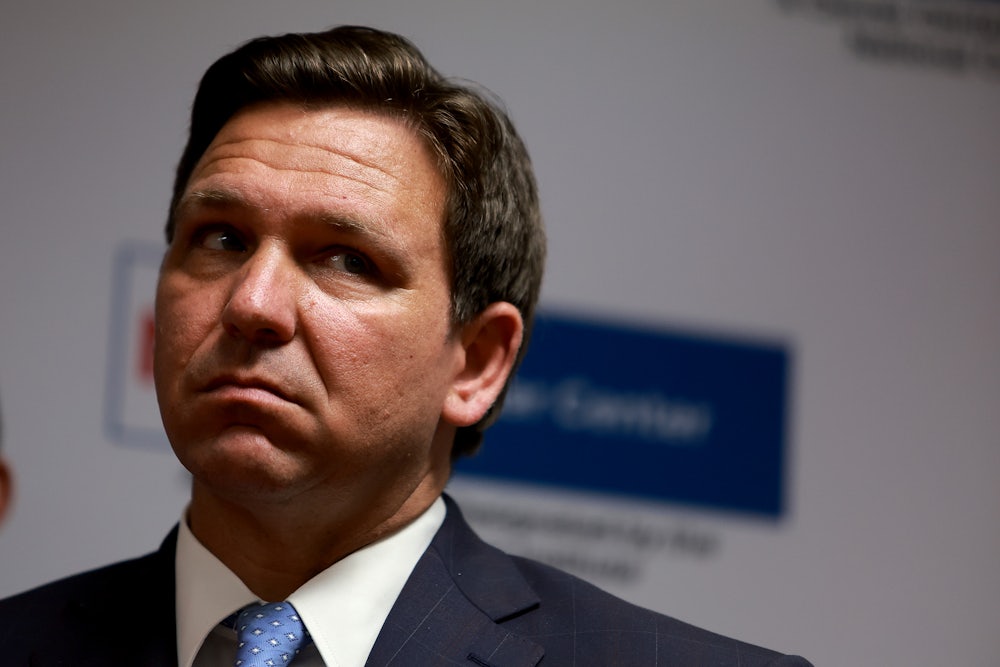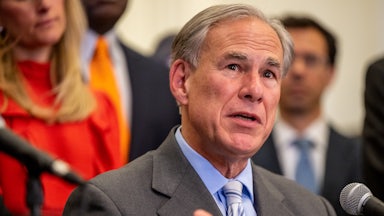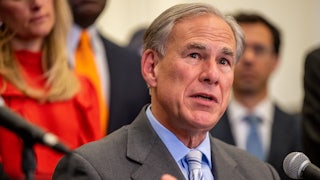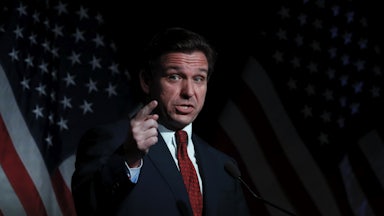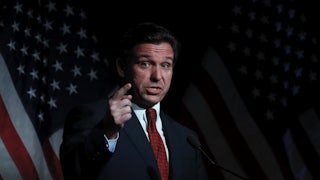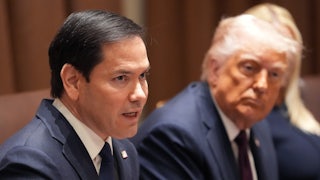On Tuesday, Florida Governor Ron DeSantis came to Washington, D.C., in the hopes of putting a fresh shine on his flagging campaign. Voters have been souring on the Florida governor of late—his poll numbers have dipped precipitously in the wake of former President Donald Trump’s arrest earlier this month—but he still had one unimpeachable case to make: He was still the only 2024 contender polling in double digits not named Donald Trump and, as such, still the best-positioned candidate to usurp him. His goal for his Capitol Hill junket was simple: Win over a group of influential Republican lawmakers, gain their endorsements, and regain momentum. Get the elites on your side, and the voters will follow.
He walked into an ambush. In the lead-up to the meeting, two of DeSantis’s home-state Republicans declared their support for—guess who?—Donald Trump. It got worse. Lance Gooden, a representative from Texas, left a meeting with the Florida governor and immediately and gleefully walked to a camera bank and endorsed Donald Trump. Most lawmakers were far less ruthless but were clearly only humoring DeSantis. “I’m not endorsing anybody. I just think it’s always good to see who’s out there,” said Iowa Republican Randy Feenstra. “I support any person who wants to throw their hat in the ring.” That’s hardly a ringing endorsement—it is, in fact, exactly what you say when you’re not sure someone has what it takes to win.
DeSantis’s Capitol Hill humiliation was the culmination of weeks of stagnation and decline. It was also the clearest sign yet that the Florida governor is spinning his wheels—and that he may ultimately decline to enter the 2024 race at all.
Life has come at DeSantis fast. Not so long ago, Ron DeSantis was the future of the Republican Party. He sought to follow in Donald Trump’s footsteps—eager to pick culture-war battles against the “woke” establishment, fond of publicity stunts that masqueraded as immigration policy, excited to make “owning the libs” the centerpiece of his agenda. But stitched to these Trumpian traits were supposed upgrades unique to the Florida governor. He was disciplined and calculating. He was young. He gave voters what they wanted but without any of the chaos that trailed in Trump’s wake. He could, moreover, reunite the Republican Party: pugilistic enough for the MAGA crowd but molded by the pre-Trump GOP; someone who could be relied upon to play the hits (cut taxes for the rich, increase defense spending, slash regulations and entitlements, etc.). The working theory held by many pundits and Republican insiders was that Trump’s heir would be a saner, more efficient model: In DeSantis, they had their man.
DeSantis is, to be fair, not yet a declared presidential candidate. But he is doing everything that someone who is running for president does: traveling to swing states, using his home base—Trump’s own residence, Florida—as a means of generating national attention, running ads about how good a guy he is. It is not going well. At all.
Even before he headed to Washington, DeSantis was already in the throes of a campaign reboot, a disaster given that this is the early stage of the primary and that, you know, he hasn’t even declared his candidacy. This week was supposed to provide a grand reset—a “play the hits” tour aimed at reminding voters and GOP elites alike why they liked him in the first place. DeSantis went after his great foe, Disney, reigniting a feud over the iconic Florida company’s alleged “wokeness.” The Florida governor’s stunt was positively Trumpian: Having been previously outmaneuvered by Mickey Mouse et al., he would have his revenge by placing a prison next to its flagship theme park. (It was not entirely clear what this was supposed to accomplish or prove, other than restarting a fight that had quieted down.) He followed the right-wing pack by decrying Anheiser-Busch for partnering with a trans influencer, telling serial fabulist Benny Johnson, “Why would you want to drink Bud Light?” He just signed a draconian six-week abortion ban into law late last week, in the dead of night, a quiet play to religious conservatives.
DeSantis’s broader strategy seems to combine his zeal for culture-war combat with a concerted effort to tack to Trump’s right on several issues, most notably abortion. Over the last two months, DeSantis and Florida’s Republicans have also, per Bloomberg, “relaxed gun laws, expanded school vouchers, and helped shield insurance companies from lawsuits.” He’s not done by a long shot: Before the state’s legislative session ends next month, he’s expected to sign “severe immigration curbs and limits on transgender health care into law.” Overall, DeSantis will make the case that he has turned Florida into a kind of Republican paradise—a place where no one is trans and everyone has a gun—and that America is next.
But the desperation has become noticeable. As DeSantis falters, this mix of publicity stunts and far-right policies looks less like the product of a maestro and more like the effort of a try-hard. If the goal is to reestablish himself as the Republican Party’s pacesetter—the politician most attuned to its base—what it’s revealing instead is the opposite: DeSantis is an empty suit; a media creation. He was first touted as the future of Trumpism—a saner and more reliable, if not kindler and gentler, version of the real thing. He rode waves of free media from across the political spectrum for years, all of which made the case that he was the young, vibrant future of the GOP. But he’s returned to shore looking depleted.
This downturn in DeSantis’s fortunes also reveals the extent to which the Florida governor—and other Republicans—have badly misjudged Trump’s own rise. He shows the clear desire to imitate the ex-president’s pugilistic style and to replicate his penchant for picking big culture-war fights. But Trump won in 2016 in large part for two reasons that DeSantis—and any Republican, for that matter—will struggle to replicate. One was that Trump was able to moderate on some positions during the campaign without taking a lot of blowback, most notably on the matters of Social Security and Medicare; he actually kept himself at a distance from some of the GOP’s most reactionary and unpopular positions. Running to his right on abortion, as DeSantis and others will do, is likely a mistake—despite the fact that Trump is ultimately the person most responsible for gutting Roe v. Wade. But more importantly, DeSantis doesn’t understand that Trump’s recklessness, the very thing to which the Florida governor is trying to present himself as an alternative, is the very key to the former president’s popularity. For many voters, it underlined the fact that Trump was not a politician—like DeSantis—and that he would govern differently from a typical Republican. Once in office, he largely didn’t deviate from party doctrine, but a glimmer of that authenticity remains—DeSantis has none of it.
DeSantis’s recent decline is a product of these weaknesses. But you can hardly blame him for trying to hitch his wagon to a presidential star: Many looked to Florida and saw, in DeSantis, what they wanted to see—or at least what the media wanted them to see. But the media machine moves in fickle fashion from one feeding frenzy to the next. The energy that sustained his early rise has largely faded—save for the occasional fawning profile—and voters are left with the real Ron DeSantis: a charisma-free weirdo whose pursuit of establishing his authoritarian bona fides is starting to look rather desperate. Now things have gotten so bleak that even some of his backers are thinking it best that the Florida governor sit out the 2024 contest and keep his powder dry for 2028. It may be that he can regain his stature as the Republican Party’s heir apparent. At the moment, however, it’s obvious that he has no idea how to do that.
